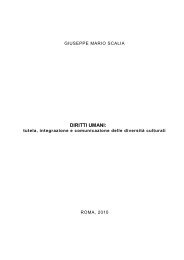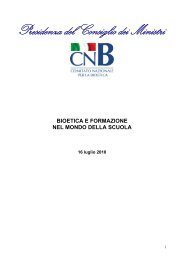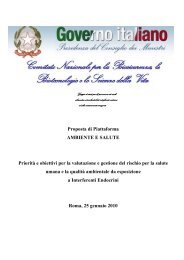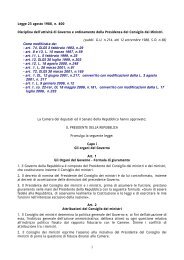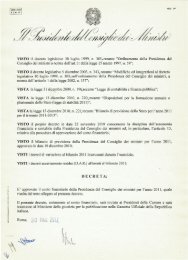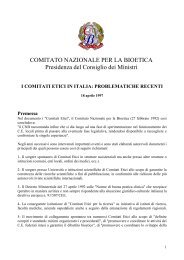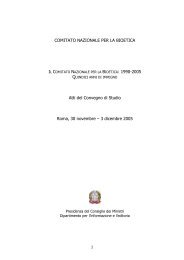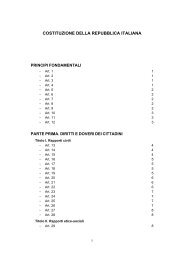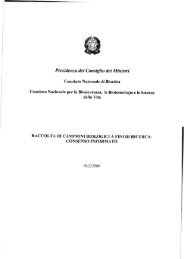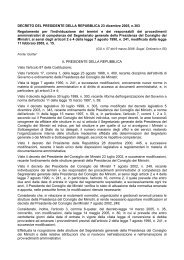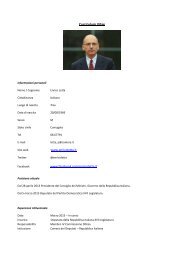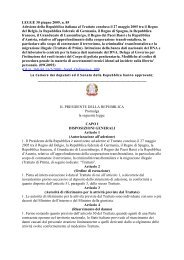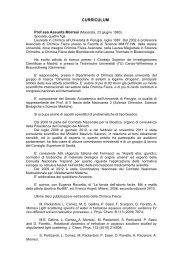President
President
President
You also want an ePaper? Increase the reach of your titles
YUMPU automatically turns print PDFs into web optimized ePapers that Google loves.
here is the acknowledgement of the absence, in effect, of the conditions<br />
necessary to fully develop each and everyone’s personality 275 .<br />
1. A particularly “vulnerable” section of the population: women over<br />
sixty-five years of age<br />
This premise seemed appropriate to better frame and justify our choice to<br />
focus our attention on a particularly vulnerable section of the population, which<br />
risks to see their generic and specific health needs underestimated: those of<br />
the so-called “elderly” women.<br />
Opening a parenthesis relative to the notion of vulnerability, it is important<br />
to remember that it was the “Barcelona Declaration” – signed in 1998 by<br />
twenty-two European specialists, coming from different disciplines and<br />
philosophical perspectives, to give value to this notion, as well as those of<br />
autonomy, integrity, dignity. These are four regulating ideas, useful not only to<br />
analyse the crucial issues of bioethics and bio-law, but also to give direction to<br />
the current debate on biomedicine and biotechnologies in a legal context, within<br />
an ethics of solidarity, responsibility and justice intended as fairness. The<br />
principle of vulnerability, which essentially expresses the idea of the limit and<br />
fragility of human existence, is at the basis, for those who are autonomous, of<br />
the possibility and need of every moral discussion and every ethics appealing<br />
to responsibility and care 276 .<br />
Returning to our topic, without intending to discuss the various<br />
classifications of aging, we include in the concept of “old age” the “range of<br />
problems” conventionally thought to begin at 65 years of age, which become<br />
increasingly relevant with the passing of time and, generally, in our society after<br />
75 years of age 277 .<br />
Many studies today tackle the issues raised in developed countries by a<br />
growing elderly population, but there isn’t always adequate recognition of the<br />
strategies of cultural, social, economic, biomedical, etc. policies, necessary to<br />
counteract the ethical prejudice of “ageism”, namely, so that the elderly<br />
population is recognised as a possible social resource and not as a burden<br />
encumbering on the whole of society and, in particular, on the younger<br />
generations. In a world where the prevalent cultural and media images daily<br />
instruct us to “take care of ourselves” in order to fight, at least in our outward<br />
275<br />
Italian Constitution, Fundamental principles: art. 3 “… It is the duty of the Republic to remove<br />
those obstacles of an economic and social nature which constrain the freedom and equality of<br />
citizens, thereby impeding the full development of the human person…”.<br />
276<br />
We must also stress that this notion has both descriptive and legal value: in fact, describing<br />
a person as vulnerable means suggesting, at the same time, an ethical response of protection<br />
and responsibility towards him/her. From this, the profound link between vulnerability and the<br />
ethics of care. But in order for this idea to be more than a utopian principle, it is necessary for<br />
society to indicate with absolute clarity what type of vulnerability it intends to focus on and with<br />
what resources: in this way, the ethics of care meets the sphere of justice. As it is easy to see,<br />
the overall message emerging from the Declaration is that vulnerability is, for the most part, due<br />
to certain situations and that therefore everyone’s commitment must be aimed at reducing it in<br />
its different aspects. In this way, we try to make sure that vulnerability is not an element of<br />
exclusion but of particular consideration and more care, taking into account the equal dignity,<br />
from a legal point of view, of every person and also of those characteristics that make him/her a<br />
unique individual.<br />
277 th<br />
Cf. NBC, Bioethics and the Rights of the Elderly, 20 of January 2006,<br />
http://www.governo.it/bioetica/pareri.<br />
218



